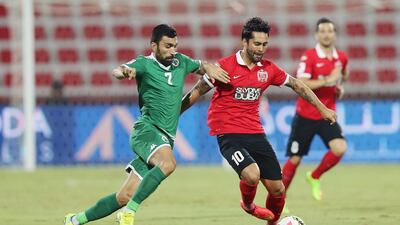DUBAI // Luis Jimenez, the Al Ahli midfielder, says the pressure is on Al Ain ahead of the Asian Champions League double-header with their fierce rivals.
The UAE clubs, familiar foes domestically, have been pitted against one another in the last 16 of the continental competition, with the first leg taking place on Wednesday night at Ahli’s Rashid Stadium. The two teams then square off again in next week’s return match at the Hazza bin Zayed Stadium.
Al Ain, seeking to improve on last year’s run to the semi-finals, would appear to be in better form heading into the tie, with the Garden City club having recently secured a 12th UAE championship. On Thursday, they began their President’s Cup defence with an emphatic 5-0 victory against Dibba Al Fujairah.
In contrast, Ahli are seeking to move on from a disappointing Arabian Gulf League campaign. The 2013/14 champions stuttered through their title defence, eventually finishing seventh. However, they have progressed to the knockout stages of the ACL for the first time in the club's history, and join Al Ain in the quarter-finals of the President's Cup following last week's victory against Kalba.
There, Ahli will play Dubai Club, a fixture that falls between the two Champions League legs. For now, though, Jimenez maintains the focus is solely on getting off to a strong start against Al Ain.
“It’s going to be difficult for both teams,” Jimenez said. “We know them, they know us, but I believe they have more pressure than us because they’re the league champions, and last season they arrived in the semi-finals, so they will want to go to the final this time. At this moment, they have more than us to lose.”
The two sides have met three times already this season, with each winning once. Ahli gleaned considerable confidence from their penultimate tussle – the Super Cup victory at the end of March – a result Jimenez says helped Cosmin Olaroiu’s men in their quest for Champions League qualification. Ahli clinched a place in the last 16 on the final day of pool play by finishing runners-up in Group D. Almost instantly, attention shifted to an all-UAE encounter.
“When we passed the group, all of the players spoke about the next round and said they wanted to play against Al Ain, so we look forward to it,” Jimenez said. “The matches are always hard, and we know Al Ain are a strong team with very good players, but we’re also a team with a lot of quality. We know how to play against them, and we always play well.
“We have played each other a lot in the past few years, but we have never met in the Champions League before, so it will be different to the league or the cups.
“Of course, we hope to beat Al Ain so we can go to the quarter-finals. But we don’t only want to get past Al Ain, we want to go farther. However, we must focus on the first step and that is winning against Al Ain.”
jmcauley@thenational.ae
Follow us on Twitter @NatSportUAE


